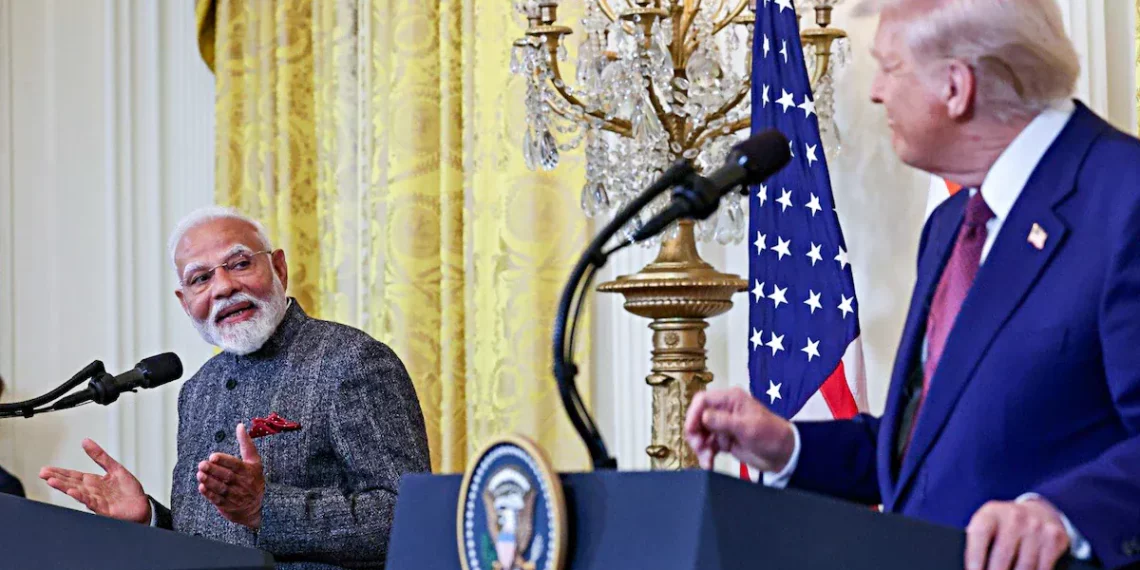No sooner did that the much-anticipated February 13 meeting between US President Donald Trump and Indian Prime Minister Narendra Modi conclude in Washington DC that spin doctors on both sides of the India-Bangladesh border went on overdrive.
The issue in contention – as was evident from a short video clip of the two leaders sitting next to each other while taking questions from journalists – was what Trump actually said, or meant to say, to a query on the American ‘deep’ state’s alleged involvement in the toppling of the Sheikh Hasina regime in August last year.
Trump denied that the American ‘deep state’ during Joe Biden’s presidency was involved in launching a covert operation that rid Bangladesh of Sheikh Hasina’s 15-year-long yoke. And here comes the twist in the Trump tale that most Indian and Bangladeshi newspapers and political analysts missed.
What Trump essentially did not deny was the existence of a ‘deep state’. Indeed, by signaling at Modi and indicating that he was better prepared to respond to that question, Trump not only acknowledged that the American ‘deep state’ had undertaken a ‘black ops’ but also that its details were known to the Indian authorities, including the prime minister.
It may be recalled that Northeast News had in September 2024 exposed the covert operation that involved clandestine overseas meetings between some of the Bangladesh students’ coordinators who led the movement to oust Hasina. These secret meetings took place in at least three West Asian countries beginning in April 2023 and in which at least two retired Pakistani generals took part.
What was subjected to varied interpretation – Trump’s response that he would leave Modi to deal with Bangladesh – in Dhaka and New Delhi was that Washington DC had given the Indian security/foreign establishment carte blanche to handle an unstable Bangladesh as it wanted to and as it suited in the context of the uncertain and potentially unstable security and political situation.
For Bangladeshi analysts, Trump merely wanted Modi to respond to the American ‘deep state’s’ operation against the Sheikh Hasina regime. On their part, Indian observers interpreted the US president’s comment to mean that the Trump regime had, for all practical purposes, given India a free hand to deal with its now-troublesome eastern neighbour.
Trump may have employed a sleight of diplomacy, but its impact in Dhaka has been “unnerving” if Bangladeshi foreign ministry officials are to be believed. At least two Bangladeshi foreign ministry officials found Trump’s response disconcerting for the reason that the Mohammad Yunus-led interim administration had done “precious little to engage with Bangladesh’s most important neighbour”.
A former senior Bangladeshi diplomat, speaking on the condition of anonymity, said, “the foreign ministry does not know where we are heading, especially in the context of the Trump-Modi meeting on Bangladesh. What we do understand is that the US has given India a blank cheque on Bangladesh. How this will unfold and what areas it will impact is not clear to us”.
This former diplomat revealed that the “nobody” in the Bangladesh foreign ministry wants to “engage with India”, especially those on the “India desk”. At least two Bangladeshi foreign ministry officials admitted that the Yunus administration’s (specifically the Environment Ministry led by Syeda Rizwana Hasan) effort to “draw China in” had come to a nought.
On the face of it, Indian officials are upbeat about the Modi-Trump confabulation in relation to Bangladesh and the role New Delhi “might play” in that country in the days and weeks to come. Whether New Delhi will begin to “call the shots” in Dhaka in the foreseeable future remains uncertain, especially when a section of the militant segment of the population is prepared to spike up anti-India sentiments by taking recourse to “extreme means”.
Even as there is ambiguity over the events of February 5, when hordes of student agitators owing allegiance to Islamist groups and outfits tore down Sheikh Mujibur Rahman’s Dhaka residence (turned into a museum in 1994), some Bangladeshi security experts expect the “overall situation across the country” to “deteriorate”.
A rapid downward spiraling of the security and political situation – along the India-Bangladesh border, for instance – could create the grounds or the conditions for a response that could be both overt and covert.















